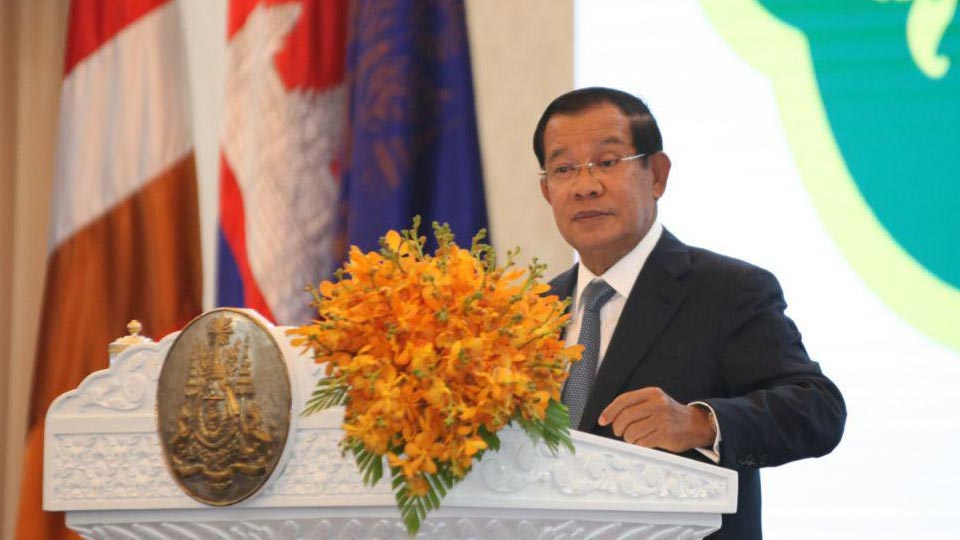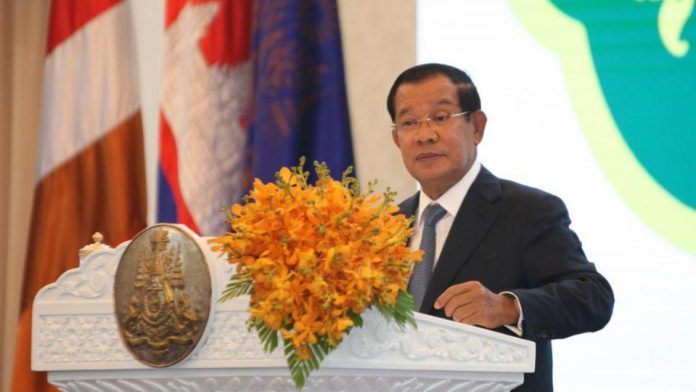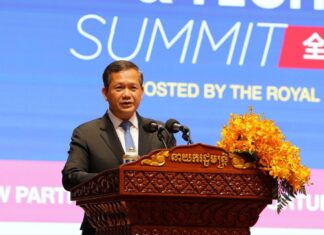In addition to the prepared text, Samdech Techo Hun Sen, at the closing session of the Annual Review Conference of the Ministry of Foreign Affairs and International Cooperation, and the Official Announcement that Cambodia Will Host the 13th ASEM Summit in 2020, made the following elaborations:

[From Text] … sanction is nothing but a policy that big country exerts pressure on smaller ones. It is not a correct policy, especially when they implement them in the name of values and principles that will bring favors to their sides or interests.
[Comments 1]
On this note, we can see this not only under the pretext of promoting and/or restoring democracy but also in others like in the name of protecting environment […] this could create tension between one region and another, for instance the issue of palm oil as in the case of Indonesia and Malaysia […]
[From text] … Cambodia contributes further in building the ASEAN community aimed at serving people and people will be the center of keeping and strengthening unity and centrality of ASEAN, whereby it would promote and strengthen relations with external partners for development and growth, and society based on two fundamental foundations – making consensus decision and none-interference in internal affairs.
[Comments 2]
On this point, please allow me to make some comments. A moment ago, Deputy Prime Minister and Minister of Foreign Affairs and International Cooperation (MFAIC) HE Prak Sokhonn proposed establishments of embassies in Africa and Latin America. In principle, I agreed to the requests. We may have one embassy in South Africa and another in Brazil. We should aim to accomplish this objective in 2021 or 2022 […]
As for ASEAN, we must look to its unity. Principle of a community, whereby consensus is fundamental has been a great experience among the ASEAN countries. I could remember that when we argue about decision on the ASEAN Charter in Cebu, the Philippines, two countries brought up two possibilities (1) in case ASEAN members could not achieve consensus, ASEAN should decide through voting, and (2) there would be this option for an expulsion of country member(s) of ASEAN. On these points, I took the lead in dialoguing with other ASEAN leaders and I made my point clearly that should ASEAN opt to making decision through voting, ASEAN would definitely be divisive. Voting would create those on the majority and those on the minority sides.
As for the second point about expulsion from membership, I raised a question about expelling members making serious mistakes […] I asked what is the grave mistake? Was it a military coup, and on another aspect of it who would define who to be committing grave or not grave mistake? Finally, we are able to preserve consensus principle. It was hard but we did it to guarantee unity in the framework of ASEAN. In ASEAN, we have countries that are big and small, rich and poor. (Thanks to this principle,) ASEAN is not divisive and does not have big brother country […]
In Europe, today the UK is leaving European Union […] in Davos, in 2017, it was just hours before the swearing in of President Donald Trump, a British scholar asked me a question if there were any member countries of ASEAN consider leaving the group. I said to him that he should change his question to what countries are going to leave EU after Brexit […] would there be any countries, and it is for a fact, that are considering of leaving? There are homegrown movements for and against in Europe, and this should be a lesson learned from Europe for the sake of strengthening ASEAN […]
UK was a founding member of EU and lately people in the UK voted in referendum to support Prime Minister Boris Johnson on his strive to leave EU with deals. It could be a suggestion that people in the UK are not happy with Europe. ASEAN should take lessons from what happened in Europe – both good ones and bad ones. We have a role in building ASEAN of solidarity and promoting harmony in the region. I am not hammering it but I have to say it since this is an issue that lies in relation between the two regions.
At present, Europe and ASEAN are not in good term. Five countries member of ASEAN have had issues with Europe, among whom Indonesia and Malaysia are having serious ones regarding this pretext (by the EU) on deforestation (for palm oil). EU response has been to cease purchase of palm oil from Indonesia and Malaysia and this could create tension between the two continents. On Cambodia, Myanmar, and the Philippines, EU have inflicted issues of human rights, and that does not include some people whom EU have always directed its threat at in ASEAN.
Against such backdrops, would strategic partnership relations between ASEAN and EU move any fast […] countries in Europe have good relations with countries in ASEAN (as we can be happy about). However, they have European Parliament and European Commission who define policies for Europe […]
Well, I am not taking this forum to criticize Europe but as a country member of ASEAN, I wish the bloc to draw up experiences from its principle of consensus and non-interference in other internal affairs. Consensus is the fundamental principle for ASEAN unity, though it could be difficult to reach a decision. However, it keeps ASEAN together and seeks for more compromising means than voting.
[From text] … contribute to efforts to reach an agreement on Regional Comprehensive Economic Partnership (RCEP); continue negotiation for new trade agreements, especially with China, the People’s Republic of Korea and Eurasian Economic Union.
[Comments 3]
We should have understanding reserved for India. In 2012, when Cambodia hosted the meeting, the Phnom Penh declaration listed sixteen countries and India was one of them. Since it was difficult to protect Indian interest, India has not yet reached the time yet. After leaving the meeting, I also talked to Indian Prime Minister and suggested a formula of 15 + 1 dialogue. This implies on the one hand we are not leaving India out and we leave the door open for the time when India may deem its participation to ASEM agreement. We will negotiate with China, the Republic of Korea and Eurasian Economic Union for Cambodia’s free trade agreements with the three.
[From text] … focus high attention on development of artificial intelligence (AI) and digital technology to cope up with neighboring countries and to strengthen Cambodian capacity in responding to risks of information technology in the era of industrial revolution 4.0.
[Comments 4]
Let me clarify this word “big countries looking onto South East Asia.” We do not mean to talk about the Indo-Pacific Strategy mentioned in this paper. ASEAN also has its own initiative on Indo-Pacific concept. We are seeking to synthesize regional initiatives, the belt and road also included […] under the former Prime Minister Manmohan Singh, India raised its “Look East” view. Now, the government of Prime Minister Norendra Modi talked about its “Act East” policy. We must reach out to this decision. South Korea initiated its “Look South” policy too. We must in this case synthesize those initiatives in the interest of ASEAN and serve as the center of solidarity between and among states […]
In the region, there are countries that create Ministry of Science and Technology. I decided to readjust focus of the Ministry of Industry and Handicraft to become the Ministry of Industry, Technology and Innovation. The Minister, HE Cham Prasidh, will lead this work, and seek to amend related laws and by laws at the National Assembly, while redrafting a sub-decree of law on organization and functioning of the Ministry. It will create units that conducts scientific and technological studies and researches […] to cope up with the industry 4.0 era […]
[From Text] … I encourage leaders in Ministries and diplomats to make further efforts to increase knowledge and raise high capacity in research and analysis of information, especially those relating to geopolitical and geo-economic developments.
[Comments 5]
At this time, 41 years ago, I started to put together the Ministry of Foreign Affairs. There were only three of people then. It was I, not even 27 years old, my bodyguard and my driver. There were no human resource. Now, 41 years later, we have plenty […] in those days we worked for a ration of both rice and corn. The current Supreme Court building was the place where we cooked for staff of the Ministry of Foreign Affairs […] Cham Prasidh, my personal secretary then, rode a black bicycle. There were no cars […] we have a different situation now. I have been the only person to serve without interruption in the past 41 years from holding the post of Deputy Prime Minister and Minister of Foreign Affairs to become Prime Minister and Minister of Foreign Affairs, before I transferred finally the post (of Foreign Minister) to someone else […]
Arriving to Moscow, we requested to meet with Andrei Gromyko, then foreign minister of the former Soviet Union. I was 27 years old and he was then 72 years old. I was so concerned that I will be meeting someone with that age and experience […] my mind came to rest in my voyage between Mumbai and Tashkent that big or small – we are representing a country. I am young but I represent a country […] after looking at the Cambodian flag on pole by that of the Soviet Union, and a car with national flags of the two countries, it weighs more to my argument of representing a nation […]
As of present, salary of our diplomatic staff in foreign countries are not that low. We have sought every means to reduce their difficulties […] I continue to stand firm on my position to allow no one to lead our nose around and we will not trade national sovereignty with favor or assistance of any form. (That would be lack of value and cheap) should we not be able to implement our laws and act according to what is required by others. Would we be still a country of independence and sovereignty? In the past, we could survive under economic embargo around us, though we had relations only with the former Soviet Union and Eastern European countries’ bloc or CMEA, plus supports from Vietnam, Laos, and India. At present, we have many trade and business partners […]./.






![Special Lecture by Samdech Akka Moha Sena Padei Techo HUN SEN, President of the Senate of the Kingdom of Cambodia, on “Leadership Experiences and Vision for Peace” to the 11th Plenary of the International Parliament for Tolerance and Peace (IPTP) [Unofficial Translations]](https://pressocm.gov.kh/wp-content/uploads/2024/12/468161445_1188047276010391_3141496335218348185_n-100x70.jpg)
